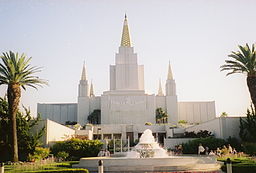Author: Julie M. Smith
-
Thinking about Miracle Stories
Should the stories of miracles that Jesus performed be considered historically accurate? Did he walk on water, or was there a conveniently placed sandbar that made his disciples think he was walking on water, or did Mark just make this story up?
-
Sexism and Ordination
I recently participated in a TribTalk about Ordain Women. Pretty much the first words out of Neylan McBaine’s mouth were something along the lines of “ordaining women won’t end sexism.”
-

Elder Oaks on Women, Priesthood, and the Temple
There is a lot that could be said about Elder Oaks’ conference talk about the relationship of women to the priesthood. In this post, I’m going to look at just one issue: the relationship of women, priesthood, and the temple.
-
Equal Means Something
It looks like one of the major responses that will be offered in the current discussion of women’s roles is that “equal does not mean the same.”
-
A Kingdom of Priests
On 30 March 1842, Joseph Smith spoke to the Relief Society. He said that he “was going to make of this Society a kingdom of priests as in Enoch’s day— as in Paul[‘]s day” (Citation).
-
An Answer for Daniel Peterson
Brother Peterson, You asked a question on your blog that I will answer here.
-

Men, Women, and Modesty
Imagine that every single talk you ever heard about missionary work was given by someone who had not served a mission or every single talk about fasting was from someone who (let’s say for health reasons) had never fasted. It is reasonable to suspect that our rhetoric about missionary work or fasting would, in these…
-
Introvert Nirvana
It dawned on me today that I have achieved Introvert Nirvana in Callings Roulette:
-
Guest Post: The Anthropology of Providing and Nurturing
This is a guest post from Julie Hartley-Moore, who has a Ph.D. in anthropology from Columbia University. She taught at BYU for 9 years, was a Dean at Elgin Community College in Illinois, and is now director of the Utah State University Campus in Tooele. She is a wife and mother of two.
-
A Seven-Participle Pile Up in Mark 5
Mark’s writing style is characterized by parataxis, which means that he writes really short, simple sentences and then joins them together with the word “and.” (It’s the kind of thing your elementary school teachers were always trying to get you to stop doing.)
-
My Beef with Goals
According to the de facto Mormon liturgical calendar, it is the time of year to talk about goal-setting. Most Mormon discussions of goals make me want to poke myself in the eyeball with a fork–a reaction I initially did not understand, since I set goals for myself all of the time. But after thinking about…
-
Stewardship
When I was in college, I took a Shakespeare class. The text was one of those huge editions of the complete works, with lots of notes further expanding its length.
-
“Cannot Change”
This announcement from the newsroom (related to ENDA and a statement from Harry Reid that “the church is changing” [ftnt1]) contains this sentence: “As such, traditional marriage is a foundational doctrine and cannot change.”
-
8 & Up
The Church has announced that starting in 2014, there will be a General Women’s Meeting twice per year, with women, young women, and girls ages 8 and up invited to attend.
-
Conference Announcement
The 2013 Conference of the European Mormon Studies Association, in cooperation with the Brigham Young University London Centre, will take place on Friday 13th and Saturday 14th of December in London.
-
Book Review: The Mormon Image in the American Mind
J. B. Haws, The Mormon Image in the American Mind: Fifty Years of Public Perception, Oxford University Press.
-
Upcoming Conferences
There is an embarrassment of riches on the Mormon Studies scene in the next few weeks.
-
Standing as Witnesses
Ronan’s post this morning reminded me of something I had written but hadn’t gotten around to posting:
-
Gone Fishin’
What kind of associations does the idea of fishing raise for you? Leisure time? Quiet? Peace? Stillness? (Hopefully not a few beers.)
-
Getting Dirt in Jesus’ Eyes
You are probably familiar with Mark 2:1-12, because it is hard to forget a story about a guy getting lowered through a roof.
-
Mythbusters: The Kneeling Camel Edition
A good portion of the next RS/PH lesson concerns the story where Jesus states that it is easier for a camel to go through the eye of a needle than for a rich person to enter God’s kingdom.
-
Rereading A Prayer for Owen Meany
I never re-read books, but I decided to read this one, twenty-two years after I first read it, because “he is the reason I believe in God; I am a Christian because of Owen Meany.” That’s a quote from the first sentence of the book, but it is true, literally true, for me, too. I…
-
Book Review: L. Tom Perry: An Uncommon Life
L. Tom Perry: An Uncommon Life: Years of Preparation by Lee Tom Perry.
